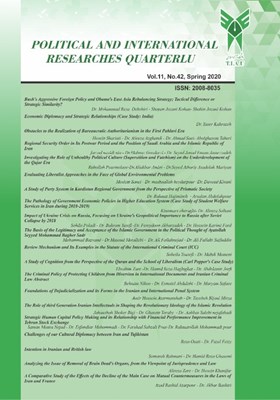A Study of Cognition from the Perspective of the Quran and the School of Liberalism (Carl Popper's Case Study)
Subject Areas : Political and International Researches Quarterly
Ebrahim Zare
1
![]() ,
Hamid Reza Haghighat
2
*
,
Hamid Reza Haghighat
2
*
![]() ,
Abdolamir Jorfi
3
,
Abdolamir Jorfi
3
1 -
2 -
3 -
Keywords: Cognition, Islam, Quran, Popper,
Abstract :
Ebrahim Zare[1] Hamid Reza Haghighat[2], Abdolamir Jorfi[3] Abstract: In this article, we examine the knowledge from the perspective of Shiite Islamists and we compare the subject of cognition from the perspective of Liberal school thinker Carl Popper. In this article, we tried to recognize the fundamentals of epistemology from the perspective of Islam and Popper, while being neutral. For this purpose, we referred to the Holy Quran as the holy book of the Muslims of the world. Due to the abundance of interpretations of the Qur'an, the book of the Muslims of the world is presented, in this study, we used interpretations in the Qur'an that dealt with the issue of cognition and they have been presented by religious scholars whose main affiliation with the Shiite religion of the Twelve Imams is obvious. The main question of the research is whether there is a difference between Islamic cognition and cognition from Popper's point of view? The hypothesis of the present article is that Popper's cognition and cognition from the perspective of Islam are different. And the reason for the importance of this research is that basically Islamic knowledge relies on religious principles. That is why the Islamic worldview and ideology relies on this knowledge, and this style of cognition is the basis and shaping of the social and political relations of Muslims. And from Popper's style of cognition, the ideology of liberalism is presented [1]- PhD Student of Law, Department of Political Science, Shahreza Branch, Islamic Azad University, Shahreza, Iran [2]- Assistant Professor of Criminology, Department of Political Science, Shiraz Branch, Islamic Azad University, Shiraz, Iran:Corresponding Author) [3]- Assistant Professor of Criminology, Department of Political Science, Shiraz Branch, Islamic Azad University, Shiraz, Iran
_||_

